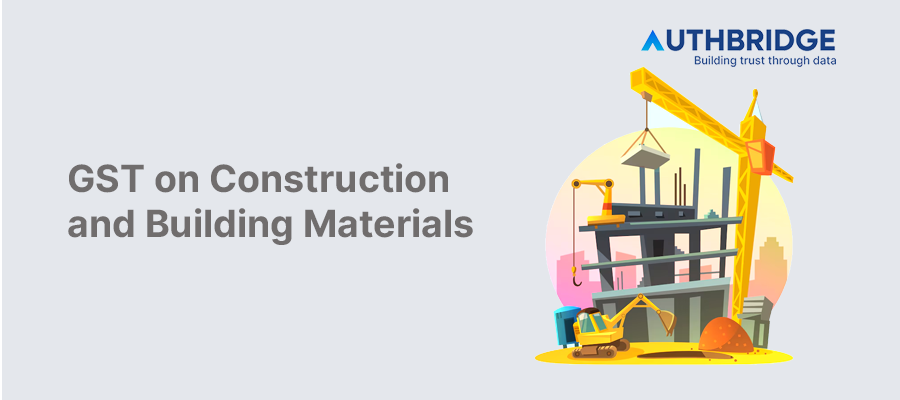The Impact Of GST On The Construction Sector

The Impact of GST on the Construction Sector
The introduction of the Goods and Services Tax (GST) has been a significant reform in the Indian tax structure, impacting various sectors, including construction. GST has aimed to unify the tax regime by consolidating multiple taxes into a single tax system, thereby increasing transparency and reducing tax evasion. For the construction sector, this has meant a reevaluation of costs, pricing strategies, and tax compliance mechanisms.
Overview of GST Rates for Construction Materials
GST has standardized tax rates for various goods and services across the country. For construction materials, GST rates have been set to rationalize the tax structure and ease the burden on the construction sector. These rates are designed to encourage compliance while ensuring that the tax burden on end consumers is not excessive. Understanding these rates is crucial for builders, developers, and consumers to make informed decisions.
GST Rates for Key Building Materials
The GST regime categorizes building materials into different tax slabs, significantly impacting the construction industry's cost dynamics. Here's an overview of the GST rates for key building materials:
Cement
Cement is a crucial component of construction, attracting a GST rate of 28%. This higher rate impacts the overall cost of construction projects, making it a significant consideration for budgeting.
Material | GST Rate |
Cement | 28% |
Steel
Steel, used extensively in construction for reinforcement, falls under a lower GST slab, making it slightly more cost-effective in terms of tax impact.
Material | GST Rate |
Steel | 18% |
Sand
Sand, essential for making concrete and mortar, is taxed at a rate that varies depending on state regulations due to its classification under natural resources.
Material | GST Rate |
Sand | 5% |
Bricks
Bricks, a primary building material, are taxed differently based on their type, with fly ash bricks having a lower rate compared to others.
Material | GST Rate |
Fly Ash Bricks | 12% |
Other Bricks | 18% |
Stones
Building stones and marble have varied rates, influenced by their luxury status and usage in construction.
Material | GST Rate |
Marble | 28% |
Granite | 18% |
Understanding the Impact
Cost Implications for Builders and Developers
The varied GST rates on construction materials directly affect the project's cost. Builders and developers need to navigate these rates carefully to manage project budgets effectively and determine the final pricing of constructed properties.
Price Effect on End Consumers
The GST on building materials also indirectly affects the end consumers, influencing the overall affordability of buying or investing in properties. While the higher tax rate on certain materials like cement increases costs, the input tax credit (ITC) mechanism can offset some of these expenses.
Input Tax Credit (ITC) in Construction
Eligibility and Conditions for Availing ITC
The GST framework allows builders and developers to claim ITC on taxes paid for inputs used in the construction process. This provision is aimed at preventing the cascading effect of taxes, thereby reducing the cost of construction projects.
Impact of ITC on Construction Costs
By availing of ITC, developers can significantly lower the effective tax burden on the construction project, potentially leading to lower property prices for consumers. However, strict compliance and documentation are required to avail of these benefits.
Compliance and Documentation
Invoicing Requirements under GST
Builders and developers must ensure that all purchases are accompanied by GST-compliant invoices, enabling them to claim ITC. Proper invoicing also facilitates transparent and streamlined tax compliance.
Record-Keeping for Compliance
Maintaining detailed records of all transactions, including purchases of materials and services, is crucial for meeting GST compliance requirements. These records support the claims for ITC and ensure readiness for audits.
Challenges and Solutions
Common Compliance Challenges
The construction sector faces challenges such as managing the high rate of GST on certain materials and ensuring eligibility for ITC. Navigating these challenges requires a thorough understanding of GST laws and proactive financial planning.
Tips for Effective GST Management in Construction
- Regularly update knowledge on GST rates and regulations.
- Maintain accurate and detailed records of all transactions.
- Seek professional advice for complex GST matters.
Conclusion
The GST on construction and building materials has a profound impact on the construction sector, influencing costs, compliance, and pricing strategies. Understanding the GST rates, availing of ITC benefits, and adhering to compliance requirements are essential for navigating the GST landscape effectively. As the GST regime evolves, staying informed and adaptable will be key to success in the construction industry.
Category

Abhinandan Banerjee
(Associate Manager - Marketing)
Abhinandan is a dynamic Product and Content Marketer, boasting over seven years of experience in crafting impactful marketing strategies across diverse environments. Known for his strategic insights, he propels digital growth and boosts brand visibility by transforming complex ideas into compelling content that inspires action.



